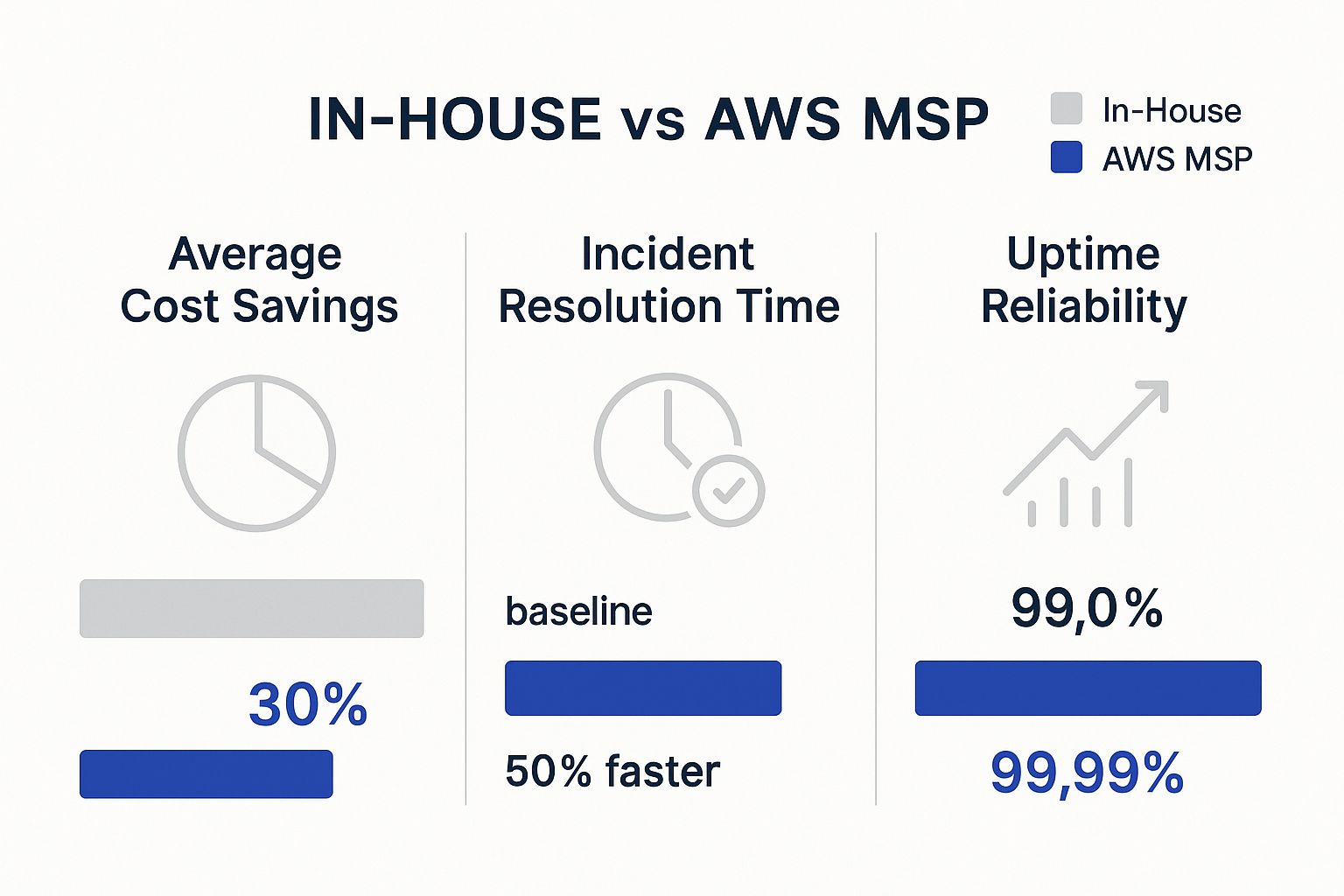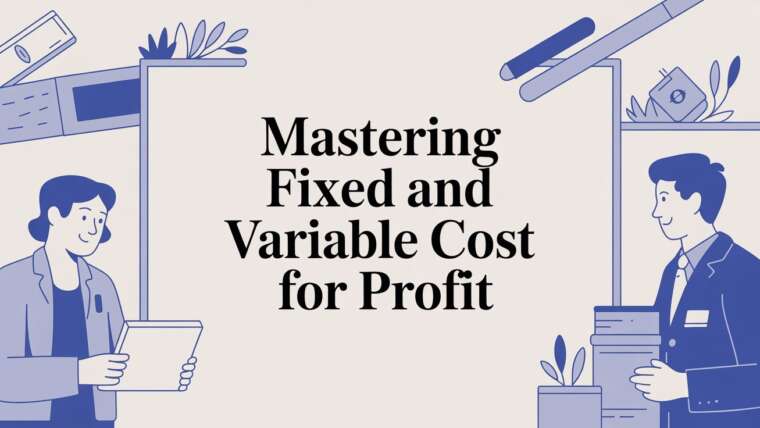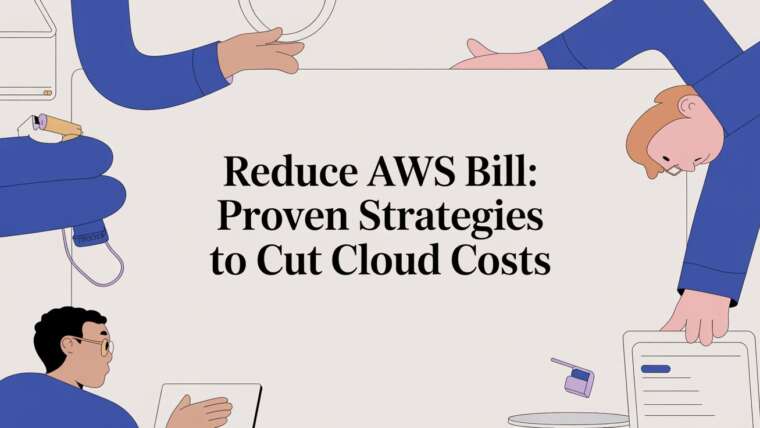An AWS managed service provider is essentially your expert crew for navigating the powerful but often complex world of Amazon Web Services. Think of them as the specialized team that handles all the technical heavy lifting, from security and maintenance to cost optimization, so you can focus on what you do best: running your business.
What Does an AWS Managed Service Provider Actually Do?

Let's cut through the jargon. What does bringing on a Managed Service Provider (MSP) for AWS really mean for your company?
Imagine your AWS setup is a high-tech skyscraper. Your team is busy doing the important work inside developing products, serving customers, and growing the business. The MSP is the expert crew managing the building itself. They handle the foundation, security systems, plumbing, and power, making sure everything runs smoothly 24/7.
An AWS MSP takes the day-to-day operational weight of your cloud infrastructure off your shoulders. This frees up your internal tech team to stop fighting fires and start driving the innovation that actually moves your business forward.
Core Responsibilities and Daily Operations
The work an AWS MSP does is a mix of proactive and reactive tasks, all aimed at keeping your cloud environment stable, secure, and cost-effective. It goes way beyond just rebooting a server.
Here’s a look at what they’re typically handling:
- Proactive Monitoring and Incident Management: They keep a constant watch over your infrastructure, 24/7. The goal is to spot and fix potential problems before they ever lead to downtime.
- Security and Compliance Management: This is a big one. They implement robust security measures, manage critical patches, and make sure your setup meets industry standards like HIPAA or GDPR.
- Backup and Disaster Recovery: An MSP doesn't just set up backups; they test them. They build a solid plan to get your services back online quickly if something major goes wrong.
- Performance and Cost Optimization: This is where the real value kicks in. They constantly analyze your usage to find savings, shut down wasted resources, and ensure you only pay for what you actually need.
By handing off these critical but time-consuming tasks, you get all the power of AWS without needing a large, specialized in-house team to manage it. It’s all about maximizing your cloud investment while minimizing the operational headache.
It's no surprise that the demand for these services is exploding. The global market for AWS Managed Services, currently valued at $1.12 billion, is expected to skyrocket to around $3.49 billion by 2032. That's a compound annual growth rate of 15.3%, fueled by more companies moving to the cloud and realizing they need expert help.
Ultimately, partnering with an MSP is about gaining expertise, efficiency, and peace of mind. To get a better feel for what's possible, you might want to explore some of our other articles on managed cloud services. It’s the smart way to let your team focus on strategic work that directly impacts your bottom line.
Why AWS Is the Undisputed Cloud Leader
To really get why a managed service provider is so valuable, you first have to appreciate the sheer scale of AWS. Amazon Web Services isn't just one of many cloud options; it's the dominant force in the market, and for good reason. Millions of businesses, from scrappy startups to massive global enterprises, have built their operations on AWS because it delivers on three core promises: infrastructure, innovation, and choice.
The first pillar of its dominance is its massive global infrastructure. Think of it as the international highway system for the digital world. With data centers strategically dotted across the globe, AWS lets businesses serve customers with almost zero delay, no matter where they are. This incredible footprint guarantees high availability and resilience, which simply means your applications stay online and perform exactly as they should.
A Platform Built for Any Challenge
Relentless innovation is what truly sets AWS apart. Every year, AWS rolls out thousands of updates and brand-new services, making sure its customers always have the latest tech at their fingertips. Whether you're diving into advanced machine learning, connecting devices with the Internet of Things (IoT), or even exploring quantum computing, the tools are there.
Of course, this constant evolution creates an ecosystem that's both powerful and incredibly complex. This is where an experienced managed service provider for AWS becomes your guide, helping you navigate the vast catalog to find and implement the right services for your specific business goals, without all the guesswork.
The platform's market leadership isn't just talk. It’s backed by massive global adoption and growth that consistently outpaces its rivals, making it a solid, forward-thinking choice for any business building for the long haul.
AWS continues to command the global cloud infrastructure market, holding a 30% share that keeps it well ahead of competitors like Microsoft Azure and Google Cloud Platform. Even more impressive, its customer base has exploded by 357% since 2020, fueled by aggressive expansion into new regions across North America, Asia, and the Middle East. You can dig into these market trends on hginsights.com for a deeper look.
At the end of the day, it's the combination of a rock-solid global network, a ridiculously comprehensive suite of services, and a culture of non-stop improvement that cements its top spot. This massive scale and complexity are precisely why partnering with an MSP is so critical they're the ones who turn all that potential into real, measurable value for your business.
The Core Benefits of Partnering with an AWS MSP
So, what does bringing an AWS Managed Service Provider on board actually look like for your business? Forget the theory the real-world advantages show up quickly in your operational stability, security, and most importantly, your bottom line. It’s a fundamental shift from just managing technology to using it for real growth.
One of the first things you'll notice is the proactive, 24/7 monitoring. Instead of your team getting jolted awake by a system alert at 3 AM, an MSP is already on it. Their entire job is to catch small issues before they snowball into costly downtime, keeping your services online and available for your customers.
This constant watchfulness naturally extends to your security and compliance needs.
Fortified Security and Cost Efficiency
An expert AWS MSP doesn't just stick with the default settings; they build robust security protocols from the ground up. They'll manage your firewall configurations, apply critical security patches the moment they're needed, and monitor for threats around the clock. This not only protects your data but also takes the headache out of navigating complex compliance standards like HIPAA or PCI DSS, a huge burden for most in-house teams.
On the financial side, cost optimization is where an MSP delivers a clear and powerful return on investment. With a deep, almost obsessive, understanding of AWS billing and services, they hunt down and eliminate wasteful spending.
An MSP acts as your financial guardian in the cloud. They are constantly analyzing usage patterns to make sure you only pay for the resources you truly need. This can lead to massive savings, often between 15% and 30% of your monthly cloud bill.
This infographic breaks down the key metrics, comparing what happens when you use an MSP versus trying to manage AWS all on your own.

As the data shows, it's not just about cutting costs. MSPs also dramatically improve how quickly incidents are resolved and boost your overall uptime.
Let's dig into the differences between keeping things in-house versus partnering with an MSP. The table below lays it all out.
In-House IT vs AWS Managed Service Provider
| Aspect | In-House IT Team | AWS Managed Service Provider |
|---|---|---|
| Cost Structure | High fixed costs (salaries, benefits, training) | Predictable, subscription-based operational expense (OpEx) |
| Expertise | Limited to the knowledge of hired staff | Access to a deep bench of certified AWS specialists |
| Availability | Typically business hours; 24/7 requires expensive shifts | Guaranteed 24/7/365 monitoring and support |
| Focus | Divided between daily maintenance and strategic projects | Singular focus on cloud infrastructure management & optimization |
| Tooling | Requires investment in monitoring and security tools | Leverages enterprise-grade tools included in the service fee |
| Scalability | Slow to scale; requires lengthy hiring processes | Can scale expertise and support up or down on demand |
Ultimately, the choice comes down to where you want your team to focus their energy.
Perhaps the single greatest benefit is gaining on-demand access to elite cloud specialists. Hiring, training, and retaining a full team of certified AWS experts is incredibly expensive and time-consuming. An MSP gives you all that expertise as a service, without the massive overhead.
This frees up your internal team to stop putting out fires and start focusing on innovation the projects that actually grow the business. The right partnership transforms your IT function from a simple cost center into a strategic driver for the entire company.
How to Choose the Right AWS Managed Service Provider
Picking a partner to manage your AWS environment is a massive business decision. Get it right, and your managed service provider (MSP) will feel like a natural extension of your team, boosting efficiency and tightening up security.
But get it wrong, and you could be looking at spiraling costs and constant operational headaches. Let’s walk through a practical framework to help you make a smart, informed choice.
First things first: you need to verify their technical chops. Don't just take their marketing spiel at face value; look for official validation straight from Amazon.
Verify Technical Expertise and Industry Experience
A provider's qualifications should be crystal clear and easy to find. The single most important credential to look for is the AWS Managed Service Provider Partner status.
This isn't just a badge they can buy. It's earned through a tough, third-party audit that confirms their operational excellence and technical skills meet Amazon's sky-high standards.
Beyond that core validation, dig into their specific competencies. Does the provider hold an AWS Competency for your industry, like Financial Services or Healthcare? This is a huge plus, as it shows they have proven success and specialized knowledge of the unique challenges you face.
And of course, ask to see case studies and client testimonials. A good provider will be more than happy to show you proof of their success with businesses like yours. These real-world stories are far more telling than any sales deck. You're looking for hard evidence that they've solved problems similar to yours and delivered real, measurable results.
When you’re vetting an AWS managed service provider, focus on tangible proof. Official AWS certifications and real client success stories are non-negotiable. They are the best indicators of a partner's ability to actually deliver on their promises.
Assess Their Support Model and Cultural Fit
Technical skills are only half the battle. How a provider communicates and supports you day-to-day is just as critical. You need to understand their support model inside and out before you sign anything.
Start by digging into their Service Level Agreements (SLAs). What are their guaranteed response and resolution times? A solid SLA is specific, clear, and lines up with your business's uptime needs. Vague promises are a major red flag.
Next, get a feel for their communication style. How will you actually get in touch when you need them?
- Communication Channels: Do they offer support through phone, email, and a dedicated portal? Or are you stuck with just one option?
- Reporting: What kind of performance and cost reports can you expect? How often will you get them?
- Dedicated Contacts: Will you have a dedicated account manager or a technical lead who actually knows your environment, or will you be talking to a different person every time?
Finally, think about the cultural fit. This partner will be deeply plugged into your operations. You need to make sure their approach to problem-solving and collaboration gels with your own company culture. A strong cultural fit makes for a much smoother, more productive partnership in the long run.
For a deeper dive, you can learn more by reading our detailed guide on the fundamentals of cloud computing management services. It’ll give you a solid foundation for asking all the right questions.
Leveraging Advanced Tools for Cloud Cost Optimization
One of the most valuable things a modern AWS managed service provider brings to the table is true mastery over cloud cost management. They’ve moved way beyond manual spreadsheets and guesswork. Instead, they use specialized tools to turn your cloud spending from a reactive expense into a proactive, strategic advantage.
This shift is a huge deal. Without it, runaway cloud costs can quickly eat away at all the benefits you hoped to gain by moving to AWS in the first place.
Expert MSPs get this done with automation and data-driven insights. Rather than just squinting at a bill at the end of the month, they get a deep, real-time view into how every single dollar is being spent. This lets them hunt down and eliminate waste before it snowballs into a serious problem.
From Manual Guesswork to Automated Savings
The heart of this strategy lies in sophisticated platforms that automate the most mind-numbing parts of cost optimization. These tools plug directly into your AWS environment to monitor resource usage around the clock.
This constant analysis automatically flags idle or underused resources think of a development server accidentally left running over a long weekend, or an oversized database that’s barely breaking a sweat. By spotting this "cloud waste," an MSP can jump in immediately to resize or shut down those resources, delivering instant savings without touching performance.
This screenshot from CLOUD TOGGLE gives you an idea of how a clean, simple interface makes it easy to schedule server uptime, which is a core tactic for cutting costs.

A dashboard like this provides a single pane of glass, letting managers easily set and override schedules. It's worlds away from trying to navigate complex cloud consoles.
Intelligent Workload Scheduling
A really powerful technique an MSP has up its sleeve is intelligent workload scheduling. Let's be honest, tons of resources like those used for development, testing, or data processing don’t need to be running 24/7. An MSP uses a tool to build precise schedules that automatically fire these resources up when they’re needed and power them down when they’re not.
This simple practice of "parking" non-production resources during off-hours can reduce their costs by up to 70%. By automating this process, the MSP ensures savings are consistent and removes the risk of human error.
This is the kind of granular control where a skilled managed service provider aws really proves its worth. They tap into their experience to create custom scheduling policies that line up perfectly with your team’s working hours and project deadlines.
If you're looking to get a handle on your own expenses, exploring the top AWS cost management tools is a fantastic starting point. By pairing their deep knowledge with the right technology, an MSP transforms cost management from a monthly chore into a source of continuous financial advantage for your business.
The Future of Cloud Management with AI

The world of the managed service provider aws is changing fast, and artificial intelligence is the next big leap forward in cloud management. This isn't just about bolting on a few new features; it's a complete shift from fixing problems after they happen to predicting them before they ever start. The best MSPs are already using AI tools to get ahead of issues before they can cause even a minute of downtime.
Think about it this way: instead of scrambling when a server crashes, what if your management platform could predict the failure days in advance by picking up on tiny performance dips? That's exactly what predictive analytics makes possible. In the same way, AI algorithms can sniff out and isolate unusual security threats far faster than any human team ever could. This is how an MSP goes from just managing operations to being a true strategic partner.
The Rise of AI-Driven Operations
This evolution is happening right as businesses are diving headfirst into the cloud. Global spending on cloud infrastructure just blew past $99 billion in a single quarter that's a $20 billion jump from the year before. A huge piece of that growth comes from the massive demand for generative AI services, which have seen growth rates between 140% and 180%. If you want to dig deeper, you can check out the global cloud market share on Statista.com.
This explosive growth makes one thing crystal clear: as cloud environments get more complicated, AI-driven management isn’t a luxury anymore. It’s a necessity for keeping things efficient, secure, and affordable at scale.
Forward-thinking MSPs are already on this. They're using AI to intelligently scale resources up or down based on real-time demand, so clients always get the performance they need without paying for what they don't. By embracing AI, the top providers aren't just keeping the lights on they're building smarter, self-healing, and far more efficient cloud infrastructures for the businesses they support.
Answering Your AWS MSP Questions
When you're thinking about bringing on a cloud partner, a lot of questions pop up. It’s a big decision. Let's tackle some of the most common ones we hear from businesses just like yours.
We want to clear the air and give you the confidence to make the right call, reinforcing some of the key ideas we've covered.
What's the Biggest Myth About AWS MSPs?
Hands down, the biggest misconception is that MSPs are only for huge companies with sprawling, complicated cloud environments. The truth is, small and midsize businesses often get the most bang for their buck from an MSP partnership.
Think about it: they get immediate access to enterprise-level expertise and powerful management tools without the massive overhead of hiring a dedicated in-house team. It completely levels the playing field, allowing them to punch well above their weight.
A common myth is that an MSP will take over all control. A good provider works as a partner, collaborating with your team to align technical strategy with your business goals, not dictate them.
Can We Still Manage Some of Our AWS Services In-House?
Of course. In fact, you absolutely should. The best MSP relationships are built on flexibility and collaboration, not a total handover. It's crucial to define the scope of work right from the get-go.
Many companies land on a hybrid model that works beautifully. The MSP handles the heavy lifting things like core infrastructure, security, monitoring, and backups. This frees up your internal team to focus on what really drives your business forward, like application development and innovation. It’s all about augmenting your team, not replacing it.
A quality provider will sit down with you to hammer out a custom plan that plays to your team's strengths and aligns with your company's strategic goals, ensuring the whole partnership is seamless and productive.
Ready to stop overpaying for idle cloud resources? CLOUD TOGGLE makes it easy to automate server schedules, reduce waste, and cut your AWS bill. Start your free trial and see the savings at https://cloudtoggle.com.




